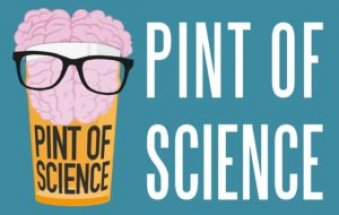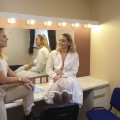Get set for Science. Next week Nottingham will be one of 32 cities across the UK that make up the annual Pint of Science Festival an annual event that aims to take science into pubs and bars and making it accessible to all.
The Pint of Science Festival runs from 9-11 May and will hit three Nottingham bars – The Waterfront, Canalhouse and Bunkers Hill, with each venue focusing on a different area of science.
At The Canalhouse the focus is on Atoms and Galaxies on Monday will be a look at how science explores all avenues for understanding our place in the universe Back to the Future – which will feature talks by Dr Ulricke Kuchner, an astronomer and artist from the School of Physics and Astronomy at UoN, Professor Haida Laing from the Department of Physics and Maths at Trent, and Jacob Home from the Nuclear Innovation and Research Office.
On Tuesday Sense and Sustainability will delve into ideas about how we can make science more sustainable and ensure the planet has a future and will feature a look at superbacteria with Dr Samantha Bryan, Assistant Professor in White Biotechnology at UoN, biofuels with Dr Luisa Ciano, from the UoN School of Chemistry and the future or batteries with Associate Professor of Physical Chemistry at UoN. Dr Darren Walsh.
Finally, Friday’s delve into Atoms and Galaxies takes a look at how man and machine work together to make sense of the inevitable in Through the Looking Glass, where Prof Philip Moriarty, from the School of Physics and Astronomy at UoN, will take a look at the weird world of Quantum Mechanics, how computers help with the study of molecular drug discovery with Dr Iva Lukac of Charnwood Molecule and Professor Jonathan Ball, professor of virology in the School of Life Sciences at UoN, and regular Coronovirus expert on BBC radio during the pandemic, will take a look at antibody treatments against coronavirus variants.
The focus is on on Our Bodies at The Waterfront starting with a look on how to communicate science and whether you can trust what you read online with Reading between the lines, Prof Philip Moriarty will be talking about how the science we read about in the media has been distilled down to catchy headlines and loses all the nuance in the race to grab attention. Then Marson Kwan, from NuVision Biotheraphies, will communicate the process of transferring laboratory research to the clinic and the challenges that throws up.
On Tuesday focus turns to how science is shaping our exercise habits with Living Laboratories. Join Dr Livia Santos, Senior Lecturer at Trent University as she explains how, despite what you might expect, exercise can actually help broken bones heal. Then join UoN Research Assistant Dr Afroditi Kouraki as to find out about how we generate cannabis-like substances in our own bodies, which increase when we exercise, and whether this is a good thing or something we need to be worried about. Finally a trio of PhD researchers at Trent University, Connor Parker, Liam Hughes and Reece Scott, explain why Sport Science can play a huge party in positively impacting society.
Finally, on Friday, focus turns to the hopes and challenges that are being brought forward in scientific advancements and the responsibilities that go with them with The Day we find the cure . Professor Chris Denning Professor of Stem Cell Biology at UoN and co-fouder/scientific-lead on the UoN COVID Asymptomatic Testing Service, will talk about biomedical technologies and the future of gene editing. Dr Phil Quinlan, Director of Health Informatics at UoN, will talk about the future of digital healthcare and the role it could play in offering better solutions for us all moving forward, finally, Professor David Bates, Director of the Center for Cancer Sciences at UoN, will talk about discovering new treatments for blindness.
The final main venue is Bunker’s Hill where the subject at had is our Beautiful Mind, first up, on Monday, the focus is on pain with Point to where it hurts. Dr Peter Gowler, Research Fellow in the School of Life Sciences at UoN, will talk at Therapeutic potentials for treating chronic pain, particularly around the potential of Omega-3 and -6 fatty acids in reducing chronic joint pain. Dr Louise Hickey, Associate Professor in Biomedical Sciences at UoN, looks at hose the brain controls pain and how understanding that can help develop better treatments to support chronic pain. Then, Dr Richard Hulse, Sensory Neurophysiologist at Trent University, looks at how the sensory nervous system regulates pain perception in health and disease.
Tuesday the spotlight turns on how we make sense of the world around us with Does that make sense? Learn about how brain activity in babies can help predict hearing outcomes and support young cochlear implant users with speech and language with Sammi Harrison, PhD Student and Research Assistant at the UoN BRC’s Hearing Theme. Raise a glass as Dr David Cook, from the School of Biosciences at UoN, talks beer. He will focus on malting science and technology, beer flavour formation and stability and the reduction of primary energy usage in malting and brewing. Finally, Denis Schluppeck, Assistant Professor at UoN, will talk about research into if brain imagining can help the recovery of sight loss in people after a stroke.
Then on Wednesday 11, A head start on health delves into the latest research on mental health and the brain. Dr Stefan Rennick-Eggleston, from the School of Health Sciences and Institute of Mental Health at UoN, will talk about the recent systemic review which reveals the various ways in which mental health narratives have been used by healthcare services, and which identifies uses that might be thought of as abusive. Tom Goddard, a PhD student at UoN, will talk about his work into whether we can predict cases of dementia before they happen and the ways different dementias develop and if this can help to find places in the process where drugs can be used to stop progression. Finally, Shazmin Majid, a PhD student at UoN and User Experience Lead at BlueSkeye AI, will talk about the use of AI in helping improve mental health and the importance of the user in AI technology design.
So, as you can see there are plenty of events across the three days covering a whole host of fantastic topics, events cost £5 standard ticket and run from 7.30-9.30pm each night, and 16-17 year old’s are welcome as long as they’re accompanied by an adult.
For more information on all events and to book your tickets head over to the Pint of Science website here





Comments Closed